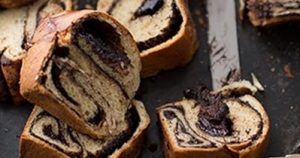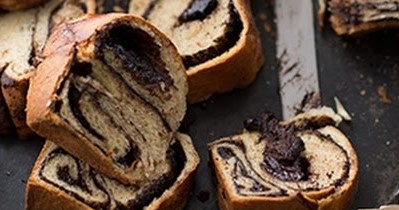
The memory is clear. And it must have happened dozens of times. Soon after my grandmother arrives on a visit to us in Maryland and is settled in the basement guest room, she appears in the kitchen with a bag.
“Well,” says my father with mock surprise as he rubs his hands together, “what have we here?!”
She pulls out a gray cardboard box tied up with red-and-white-striped baker’s string and sets it on the table.
“I cannot even tell you,” says, looking weary. “First I went to the Cakeland, then to Éclair. Agh!” She pursed her lips in frustration, then relaxed. “Kuglof,” she announced, patting the package.
There was often poppy seed cake and cookies, too, but Kuglof was the prize. We devoured it after dinner, while, invariably, my grandmother and my father absent mindedly pulled apart their pieces, examined the texture of the cake, lingered over the chocolate, deconstructed its quality.
Do Not Ever Call It Babka
Every family, every culture, has it’s own quirks and traditions, its own memories. Here’s how I recall Kuglof (“KOOG-loff”). It was a rectangular loaf cake. All the edges were fairly square. All the sides flat. The outside was browned, but not crusty. The loaf itself was rolled, and inside was a swirl of dark chocolate that, as I recall, had a slight crunch to it in parts. Was that extra sugar in the chocolate? The cake itself was a bit airy and flaky, and somewhat moist, though not overly so.
I will say this once: Kuglof was NOT babka. Please, do not ever call it babka. With its puffy top, lumpy shape, and excessive filling, a babka always exhibits a sense of having been thrown together. It’s like a messy room that’s been hastily neatened by an inherent slob. Babka is a kind of bread, with ample chocolate or cinnamon in it to satisfy, but also to distract from the fact that, at the end of the day, it is ordinary. Kuglof was not ordinary. It was pastry. The crust, the cake, the chocolate had a deeply thoughtful balance which produced a sophistication that did not stimulate cheaply, like buttery-sugary-chocolaty babka. It uplifted and delighted.
It used to, anyway. Kuglof, for me, is but a memory. It exists no more. Not how I knew it. Even when I did know it, its days were numbered as this refined culinary immigrant from Central Europe was assimilated into America and American capitalism.
Arguing Over Strudel And Schlag-Topped Coffee
While she tried to get her footing after arriving in America in 1950, my Hungarian grandmother worked for a time at Cakeland bakery on 108th Street in Forest Hills, Queens. Cakeland was run by the brother and brother-in-law of her second husband. They were fabulous bakers.
“The Kuglof at Cakeland, it was so flaky and delicate, like the air,” my grandmother said once “And the poppy seed cake was sweet and stuffed so generously,” she added, lingering on the last word. “We always used a little more poppy seed than the recipe.” She laughed, but then her face turned dark. “Agh! The new owners, they cheapened the ingredients, thinned all the fillings!” She pressed her thumb and index finger together and frowned, bitter at these crimes against proper pastry making.
But for a time these great Hungarian bakeries replicated aspects of home. Some would say the most important aspect: food. Many fondly recall A.M. Seliger’s Éclair Bakery on West 72nd Street, which opened in 1939 and lasted fifty years. Alongside throngs of displaced central Europeans arguing over strudel and schlag-topped coffee, one might have seen Isaac Bashevis Singer, Toscanini, or Stephen Wise. And during a few years in the early 1950s, one might have been served at the counter by my grandmother.
She Took A Room At The Paris Hotel
In 1949, she remarried a childhood friend who’d left for America before the war (my grandfather died of a brain hemorrhage in 1943). Her purpose in doing so was to escape Communism, but first she had to escape Hungary, arranging for herself and her children to be smuggled to Vienna.
When she got here, she learned that her second husband had no job, and soon experienced his physical abuse. At one point she walked out. She took a room at the Paris Hotel on 97th Street and West End and thought things over. Nearly a half-century later, I took my first apartment in the city right across the street on 97th. Also facing a kind of cross-roads, I often found myself on a bench along Riverside Drive looking out over the gray Hudson River. I imagined her there on those same benches (had they even had benches there in the 50s?) working out what to do.
She’d been in the baker’s union at Cakeland, and through the union she found out about a job at Éclair. Later, she would take a job with the city hospitals department, where she would spend two decades. But before that, there were four years at Éclair. Not long after she started there, Emery showed up. And some combination of his requests, my father’s pleas, and lavish gifts from Emery’s relatives persuaded her to return to Queens. She was extraordinarily resourceful and resilient, and I fantasize that after a time there was no violence, if perhaps also no peace.
And there she would be at the kitchen table, not long after settling into the guest room, patting another of those gray boxes, tugging loose the knot of baker’s string, pulling out a Kuglof, regaling us with her search all over the city, which ended, inevitably, at Éclair.
We would have it for dessert, and then maybe the next afternoon with coffee (or for me, tea or milk – I know, it was a terrible sin). Perhaps a month or so later, if there was any to have been saved, we’d take a few slices from the freezer and soon they would emerge from the oven hot, slightly toasted, and filing the room with an exquisite aroma.
The shape, the textures, the flavors, they’re all gone now. The people, too. A.M. Selinger, my grandmother, my father. And maybe that is what has made Kuglof even more treasured. It is true that the splendor of memory has many advantages over the imperfections of the present. I don’t mind. I don’t expect to find a proper Kuglof again. Still, I will keep my eyes open for it. Rectangular. Brown. Flaky. Rich chocolate. And definitely not babka!
Buy the book, Finding Maria (Bloomingdale Press – 2nd edition November 25, 2019), on Amazon

